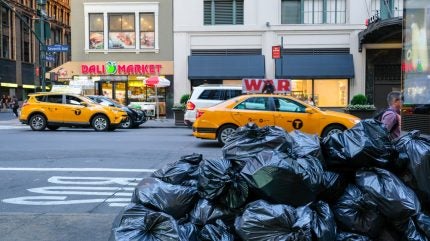
The New York State Senate has passed the Packaging Reduction and Recycling Infrastructure Act, a sweeping bill aimed at tackling plastic pollution and shifting the financial burden of waste management from taxpayers to manufacturers.
Approved by a 33-25 vote, the legislation seeks to reduce single-use plastic packaging by 30%, ban 17 toxic substances used in packaging, and create a new oversight body to enforce compliance.

Discover B2B Marketing That Performs
Combine business intelligence and editorial excellence to reach engaged professionals across 36 leading media platforms.
The bill now moves to the State Assembly for further consideration before the legislative session ends in June.
Targets packaging waste and toxic materials
The legislation mandates a phased reduction in plastic packaging over 12 years, with the goal of cutting packaging waste by nearly a third.
By 2052, all packaging materials—including plastic, paper, glass, metal and cardboard—will be required to achieve a 75% recycling rate, with progress tracked through a series of interim benchmarks.
The act also prohibits the use of several hazardous chemicals often found in packaging, such as PFAS, polyvinyl chloride (PVC), lead and mercury.

US Tariffs are shifting - will you react or anticipate?
Don’t let policy changes catch you off guard. Stay proactive with real-time data and expert analysis.
By GlobalDataThese chemicals have been linked to environmental harm and health risks, including cardiovascular disease and cancer.
The bill rejects the inclusion of chemical recycling as an acceptable form of recycling under state law, citing its reliance on energy-intensive processes and fossil fuel outputs.
Producer responsibility and taxpayer savings
A key feature of the act is extended producer responsibility (EPR), which shifts the cost of packaging waste management from municipalities to the companies that produce it. Producers will be required to pay a fee to help fund recycling infrastructure and waste reduction initiatives.
According to a report by Beyond Plastics, the law is projected to save New York taxpayers $1.3bn over the next decade by reducing landfill and incineration costs. These financial savings do not account for the revenue generated from producer fees, suggesting additional long-term economic benefits.
Broad support amid growing environmental concerns
Over 300 organisations and businesses, including NYPIRG, Environmental Advocates NY, and the League of Women Voters, have endorsed the legislation. More than 30 municipalities across the state, including New York City, have issued formal resolutions backing the bill.
Supporters point to the growing environmental and health risks associated with plastic pollution. Scientific studies continue to uncover the widespread presence of microplastics in human bodies and natural ecosystems.
Recent research links microplastics to heart attacks, strokes and premature death, and finds high concentrations in bottled water and even human blood.
As plastic production is expected to double globally over the next two decades, legislators and environmental advocates argue that strong state-level action is essential.
The Assembly is expected to take up the bill in the coming weeks, with Speaker Carl Heastie indicating it will receive a floor vote this session.





